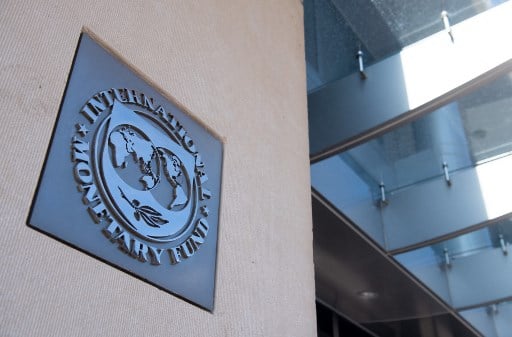IMF says only flexible exchange rate will pull Kenya out of currency shock – Business Daily
Signage at the International Monetary Fund (IMF) headquarters in Washington, DC. PHOTO | AFP
The International Monetary Fund (IMF) says a flexible exchange rate will help Kenya insulate its economy from the external shocks facing its local currency, at a time it is trading at record lows, choking supply chains.
The weakened Kenya shilling has prompted fears that the depreciation could further feed into consumer prices.
The shilling hit a new record low trading against the dollar after it weakened to 117.04 on Friday signalling a continued rally in prices of imported commodities like fuel and cooking oil.
If the shilling falls further the risk is that distressed consumers — already hit hard by big food and fuel price rises — may turn restive ahead of key elections in 2022.
“The Kenyan economy has demonstrated notable resilience in very difficult circumstances,” said an IMF spokesperson on Friday in response to Business Daily queries.
ALSO READ: Shilling crosses 117 against the dollar
“In this context, a flexible exchange rate is an important shock absorber.”
The Central Bank of Kenya (CBK) maintains it is committed to a flexible exchange rate regime and will not deviate from that policy despite the weakening of the shilling.
“We are fully committed to a flexible exchange rate regime. We know the benefits of that and we are not deviating from that,” said CBK governor Patrick Njoroge earlier.
The Central Bank governor stated then that Kenya is committed to keeping a free-floating exchange rate, adding that the bank only intervened to smooth out excess volatility.
The current continued weakening has hit manufacturers who have raised the alarm on the dollar shortage and cited a struggle to settle payments to oversee suppliers on time.
Dr Njoroge recently underplayed the level of depreciation and disputed claims on the constraints in dollar supply.
The IMF said on Friday it will continue to offer financial support for Kenya through its regularly reviewed Extended Fund Facility and Extended Credit Facility programmes agreed with Kenya previously.
Kenya has not made an application for a short-term liquidity line created in 2020 to help member countries with strong fundamentals deal with the new coronavirus pandemic, the IMF added.
“The IMF is supporting Kenya under the ongoing EFF/ECF arrangements. At the next review, which is expected to be completed this summer, Kenya would have access to about $244 million (Sh28.5 billion),” said the IMF.
“No request has been made for any access under the SLL and the SLL is not designed to run concurrently with other IMF-supported programs.”
Kenya Association of Manufacturers (KAM) in April said their members had faced strained relations with suppliers due to dollar liquidity in the market, at a time competition for raw materials has intensified globally due to rising demand amid lingering supply chain constraints.
ALSO READ: Dollar shortage sparks parallel exchange rates
The Kenyan currency has suffered the strengthening of the US dollar which has appreciated by 6.8 percent since the start of the year, following the recent rate hikes that have made the greenback a safe haven for investors amid global uncertainties following Russia’s invasion of Ukraine, analysts said.
The central bank’s Monetary Policy Committee adopted a tightening stance in May, raising its key interest rate for the first time in almost seven years to anchor inflation expectations as concerns about commodity prices build.
The monetary policy committee increased the rate by 50 basis points to 7.5 percent.
[email protected]











